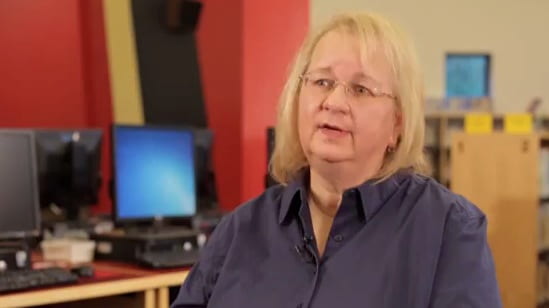
Georgene Collier, fifth grade science teacher
How has it changed the way you teach science?
This program has changed the way I teach in so many ways. When I first started teaching science, I was pleased if the students did the experiment the way I told them to. But that was boring to me — and boring to the kids. The program has given me confidence and expanded my thinking about science and about how I wanted to present science in the classroom. And it has made a world of difference in my interests, in the kids’ interest and how they perform (on tests).
How are the students benefiting from your participation in the cohort?
I have noticed that my students are benefiting from my participation in the program. Before we do an experiment, we talk about, ‘Can we make a mistake?’ ‘Can it be wrong?’ ‘Can we do it again?’ ‘Can we revise what we think is going to happen?’ They’re totally relaxed and not looking to me for cues to say, ‘Yes you did it right.’ They’re collaborating with each other. They think they’re actually scientists – and they are! They want to think through the process, and when they understand, they can take a concept and expand it further.
Students are preparing for middle school with a good basic knowledge, which they can expand upon. Hopefully, when they enter high school they are still intrigued with the process they learned and will find a place in science for themselves. That makes my heart happy!
How does that apply to the actual testing?
During the actual testing, students have a good understanding of what is occurring. Therefore, at test time, they can look at the question and think to themselves, ‘Okay, we did this. How can I connect that to this question?’ That makes all the difference in the world in their understanding. It’s a total connection to the entire process.
What’s the best thing about going through the program with other teachers in your district?
The best thing about going through the program with colleague is the collaboration. Teachers like to talk and when we talk, we share ideas. Whether you’re a kindergarten teacher or a 12th grade physics teacher, we discuss education. We collaborate, we find common ground. It’s a wonderful thing, this collaboration, this getting-together of science people to talk. It’s priceless.
What’s it like to teach science in the 21st century?
Teaching in the 21st century is challenging, mainly because of the technology. We are learning along with the kids, and every day something new is on the horizon. Sometimes it is challenging for me to keep up with and have that time to search, for example, when a meteor shower might be happening so I can teach the kids. Teachers and students are learning new things using technology that is ever-evolving.
Are there other benefits to your participation in the ISP’s program?
One benefit of my participation in the ISP program is the use of trade books in my classroom. I have a beautiful array of vetted trade books that are kid-friendly, student-friendly and me-friendly. I can read to them, or they can read and further their knowledge without me. They can pick a book they are interested in on such topics as biomes or a particular animal or space. And they can sit in a quiet moment in the classroom and get lost in the book. And it’s good, vetted, scientifically approved information. So they have a good basic knowledge and they share those books. They will ask another student and ask, ‘Did you read this?’ or ‘Look at this, you’re gonna like it.’ How beautiful of an experience is that? Without the cohort, this would be a rare experience.
Has the cohort helped shape your professional development as an elementary science teacher?
Without a doubt the cohort has helped me as a teacher. I feel sorry for teachers who cannot participate in the program. That’s why I’m in it a second time. I’m not going to quit now. I want to keep learning. I think it is so worthwhile. I can pick up the phone and email one of our ISP instructors and ask ‘What do you think? Where is my thinking on this that you see that I can be better at it?’ And they are more than willing to tell me. Being a part of the cohort is without a doubt the best thing that I have done.
Georgene Collier teaches fifth grade science at Russell Elementary in the Hazelwood School District. She has been involved in the Institute for School Partnership’s teacher education program with the district since its inception and is continuing as a teacher leader.